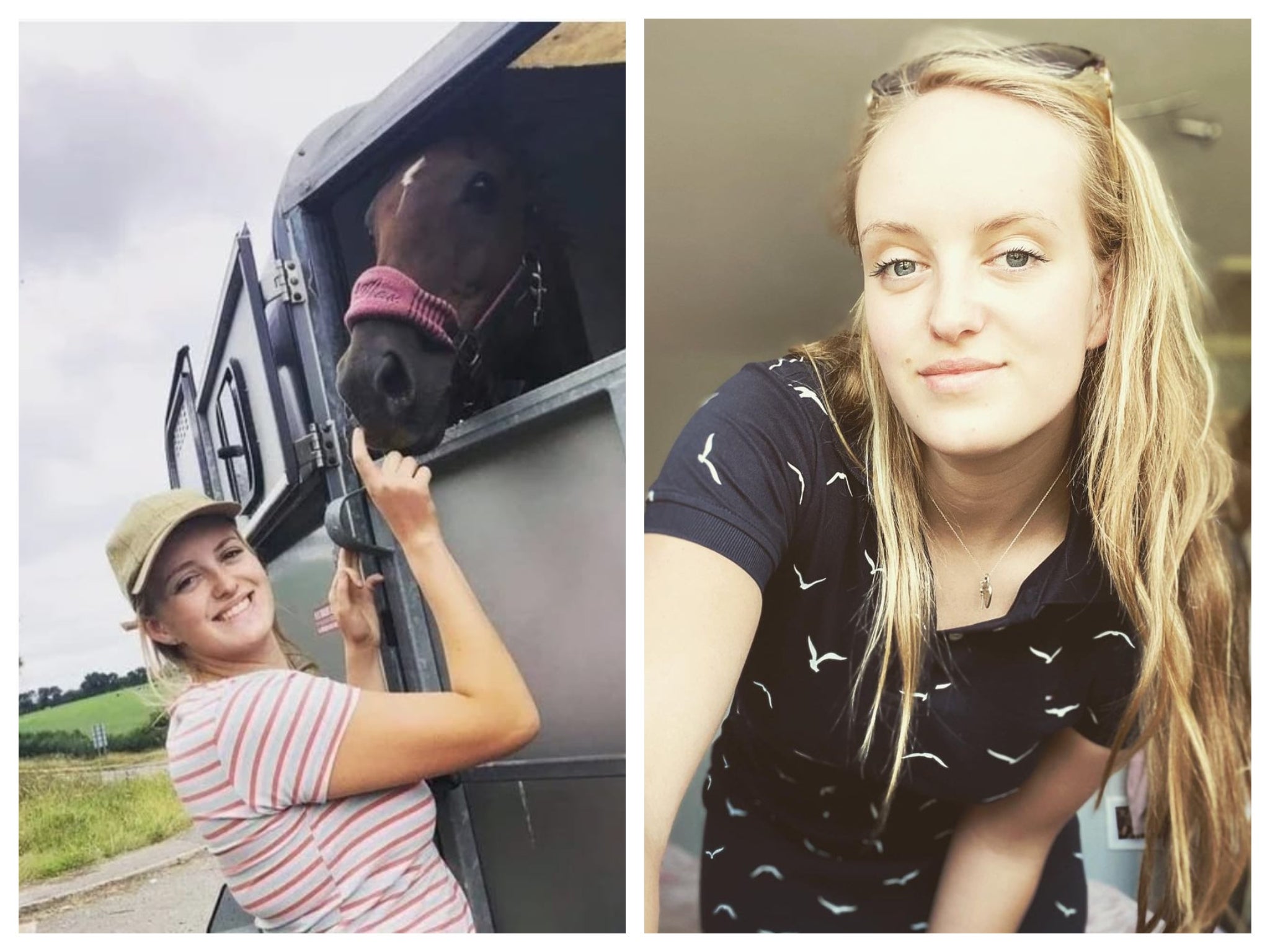‘A pattern of fixation and obsession’: How the pandemic exacerbated stalking cases in the UK
Following the murder of 23-year-old Gracie Spinks, who was killed by her stalker in June 2021, Laura Hampson asks what’s being done to protect stalking victims in the UK


Update: The Gracie’s Law petition has surpassed 100,000 signatures which means it will be considered for debate in parliament. Gracie Spinks’ parents will present the petition to parliament in the coming weeks. In the article below, originally published in November 2021 and updated in January 2022, we reported on Spinks’ story and the rise of stalking cases in the UK.
In the quiet early hours of 18 June last year, 23-year-old Gracie Spinks was tending to her horse, Paddy, at the Blue Lodge Farm in Duckmanton, northeast Derbyshire. Moments later, she received a fatal stab wound to the neck.
Derbyshire man, Michael Sellers, whom Spinks had previously accused of stalking her, is suspected by police to have killed her before killing himself in an apparent murder-suicide. An inquest into Spinks’ and Sellers’ death is still ongoing.
Sellers had been Spinks’ supervisor at work when the pair went on a date. When Spinks let him down gently, harassment ensued. First it was messages to Spinks. Then it was to her colleagues, asking them where she was and who she was talking to. Sellers was let go from his job after his colleagues revealed he had sent them almost 200 messages about Spinks. However, it was when Sellers turned up unannounced at the stables in February last year that Spinks decided to report Sellers to the police for stalking. It is unknown whether Sellers was ever contacted by the police.

Reports of stalking cases have been steadily increasing over the past decade. During the pandemic, the combination of time spent at home and online led reports to skyrocket. In 2020, more than 80,000 incidents of stalking were recorded by police officers in England and Wales, the latest Office for National Statistic (ONS) report says – up from the 27,156 incidents reported the year prior. According to the 2019/20 Crime Survey for England and Wales, 3.6 per cent of adults aged 16-74 are estimated to have experienced stalking in the last year – equivalent to 1.5 million people, which figures show equates to 977,000 women and 526,000 men.
Violet Alvarez, Senior Policy and Campaigns Officer for the Suzy Lamplugh Trust, a personal safety charity and home to the National Stalking Helpline, says stalking affects one in five women and one in 10 men across the UK. “The way that we define stalking is that we see it as a pattern of fixation and obsession,” Alvarez explains. “So the obsession and fixation is really what’s driving the perpetrator and for the victim it’s unwanted and it’s repetitive.”
But it’s more than just an obsession. Experts consider stalking to be primarily about “power and control”. In most cases, says Rachel Horman-Brown, lawyer and chair of Paladin, the National Stalking Advocacy Service, stalking is carried out as an “intentional planned way of terrorising and causing maximum distress to their victims. Stalkers will target that which is held most dear to the victim.”
The obsession and fixation is really what’s driving the perpetrator. For the victim it’s unwanted and it’s repetitive
Alvarez explains that 55 per cent of stalkers are the ex-intimate partner of their victim, but 45 per cent have a “completely different relationship”. “We’ve seen a lot of neighbour stalking cases during the pandemic,” she says. “As you can imagine that kind of fixation and obsession is really going to ignite when the person is easily available to you.” Online stalking abuse has also risen, with stalkers using various digital methods to “get closer” to the victim, including GPS tracking and spyware and even drones.
Over 80 per cent of the victims who call the National Stalking Helpline are female and generally, she says, perpetrators are male. Typically, by the time a stalking victim contacts the police they will have experienced up to “100 incidents” of stalking. “The police response is generally pretty appalling,” Horman-Brown says, describing what she says is an attitude of disbelief.
This response is what led one woman, Jackie Barnett-Wheatcroft, to launch a petition calling for more funding to help stalking victims following Spinks’ death. Gracie’s Law would introduce a “stalking advocate” – someone who would be a victim’s first port of call, who can help aid and guide them when they are putting in a complaint about their stalker to the police. The stalking advocate “would be trained to look out for coercion, manipulation, all those kinds of signs that show that, well actually, this could be quite serious,” Barnett-Wheatcroft explains.
When it comes to reporting, activists advise women not to downplay their experiences. Horman-Brown says that when you initially report a stalking case, it’s important that you use the word “stalking” to ensure that the police look at the incidents as a whole, which could lead to them putting a stalking protection order in place. This is where writing down the evidence and having witnesses, letters or screenshots can help. “Victims should be fully protected when they report stalking as the police have a number of ways of ensuring that this is the case,” Horman-Brown continues. “In reality, however, the police often don’t use these protective measures and sometimes victims are placed at greater risk. This is why it’s also worth getting advice from a specialist stalking charity or solicitor at the same time.”

Last month, Spinks’ parents told the BBC that their daughter was “let down” by the police. Spinks’ mother, Alison Heaton, said: “She had made a complaint and they just basically didn’t join up the dots.”
Deputy Chief Constable Paul Mills, the National Police Chiefs’ Council lead for stalking and harassment, told The Independent that the police are “committed to doing everything possible to bring offenders to justice and protect victims”. He adds: “We have updated the training and guidance to all officers and staff and there are now specialist advisors in each force who are responsible for improving standards. We now work closer than ever with the Crown Prosecution Service to improve the way we investigate and prosecute offenders. In the last two years, we’ve really focused our efforts on increasing the reporting of stalking offences, to understand stalking behaviour, why it occurs and its frequency.”
In 2018, the NHS launched the Stalking Threat Assessment Centre (STAC), a multi-agency specialist unit which is run in partnership with the Metropolitan Police Service, the National Probation Service and the Suzy Lamplugh Trust. The aim of STAC is to improve responses to stalking across the criminal justice system through increased reporting, rehabilitative interventions and better criminal justice responses. “The psychological profiles of stalkers are all very different and you wouldn’t be able to put them all in one group,” Alvarez explains. “That’s why what you really need is a more holistic response that includes mental health support, advocacy support and probation.”
Police often don’t use these protective measures and sometimes victims are placed at greater risk
If anyone is concerned about being stalked, there are a number of ways to get help. Anyone in immediate danger should call 999. If it’s not an emergency situation, the National Stalking Helpline on 0808 802 0300 is available between 9.30am and 4pm on weekdays and up to 8pm on Wednesdays. The Suzy Lamplugh Trust also has an online tool called ‘Am I Being Stalked’ where possible victims can get clarification if what they are experiencing is stalking. Horman-Brown advises anyone concerned to keep a diary of what’s happening and to report it to the police at the earliest opportunity – even if they are not sure whether or not what is happening to them is stalking.
The Gracie’s Law petition currently has just over 79,000 signatures. At 100,000 signatures, the petition will be considered for debate in parliament. However, on 27 August 2021, the government responded to the petition saying it had provided more funding to stalking charities, including specifically for advocacy, both this year and last. It said the Home Office provided £97,000 of funding to Paladin between April 2020 and March 2021 to enable them to engage additional Independent Stalking Advocacy Caseworkers.
It adds that the Home Office part-funds the National Stalking Helpline and has “recently tripled its funding, such that it will now provide up to £155,000 this year. The additional funding will, amongst other things, enable the Trust to expand its advocacy service outside London”. But campaigners think it doesn’t go far enough. Gracie’s Law is calling for more funding to be available for stalking advocates across the wider UK.
It’s clear more help and education around the issue is needed. Gender-based crimes from sexual assault and abuse to stalking have made headlines in the past year following several high-profile murder cases including that of Sarah Everard and Sabina Nessa. But only tangible action will reduce these heinous crimes – and campaigners are determined not to let their cries for help fall on deaf ears.
Spinks’ case is currently being investigated by the Independent Office for Police Conduct. Her father, Richard Spinks, recently told the BBC: “She lit up the room wherever she went. A very loving, caring person. We were very proud to have her as our daughter."
Join our commenting forum
Join thought-provoking conversations, follow other Independent readers and see their replies
Comments
Bookmark popover
Removed from bookmarks